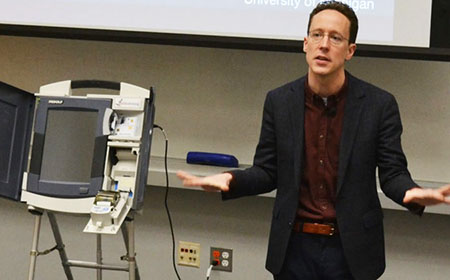by WorldTribune Staff, January 23, 2024
A voting systems expert demonstrated in a Georgia court on Jan. 18 that Dominion Voting Systems machines can easily be hacked.

University of Michigan Professor of Computer Science and Engineering J. Alex Halderman used a Bic pen and smart card to copy, edit, and change votes in seconds in front of U.S. District Judge Amy Totenberg in an Atlanta, Law360 Pulse reported.
The case is a lawsuit from an election integrity group seeking to remove Dominion machines in Georgia in favor of paper ballots ahead of the 2024 election.
The suit was originally filed in 2017 by the Coalition for Good Governance, a liberal activist group, which claimed the state’s use of voting machines which include touch-screen computers to cast ballots without the benefit of a verifiable print ballot, made the voting counts susceptible to manipulation.
After the suit, Georgia election officials changed their voting vendor in 2020 to Dominion Voting Systems, which also used a touch-screen ballot but provided voters with a paper ballot containing a QR code containing their vote information.
The Good Governance suit, however, asked a federal judge to order Georgia to stop using Dominion since they claimed their machines remain vulnerable to attack.
The suit also claimed the Dominion machines offer voters a paper QR code that cannot easily be read to verify the accuracy of their vote.
Halderman began his demonstration on Jan. 18 by asking a plaintiffs’ attorney to borrow a pen. He then inserted the pen into the Dominion voting machine and held it there for a few seconds, which caused the machine to reboot into “safe mode.”
Halderman then explained that a person could copy or change files on the voting machine, change its operating settings, or install malware.
Halderman said accessing the “terminal emulator” could allow a user to bypass the computer’s normal security settings and obtain “super-user” access — something that allows a person to read, monitor, and change “anything,” including ballots, on the voting machine with “no limits.”
“All it takes is five seconds and a Bic pen,” Halderman said.
Halderman also inserted a “$10” smart card into the machine. He said such smart cards can be programmed to replicate cards used by poll workers, voters, and technicians to access the voting machines.
The poll worker and voter cards can be used county-wide to “print as many ballots as you would like,” Halderman said.
Totenberg, an Obama appointee, is expected to issue a ruling in the case in late spring or early summer.
Publishers and Citizen Journalists: Start your Engines
